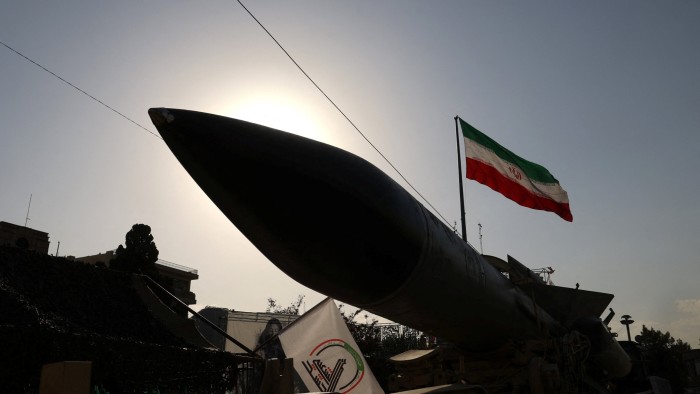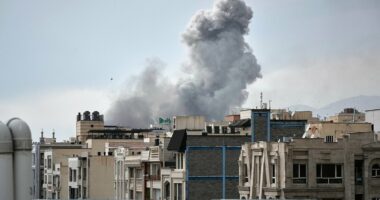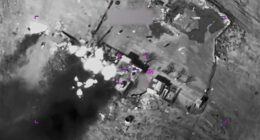Share this @internewscast.com
Unlock the Editor’s Digest for free
Israel has carried out multiple attacks in Iran amid months of increasing tensions concerning Iran’s quickly progressing nuclear program, significantly intensifying a crisis that has affected the Middle East for over a year.
Large explosions were reported throughout Tehran around 3:30am local time, with initial videos and photos shared by Iranians on social media showing smoke rising from various locations in the city. Concerned about potential strikes on residential areas, some residents have evacuated their homes.
The Fars News Agency, linked with Iran’s Revolutionary Guards, reported that “unconfirmed reports suggest that several residential buildings were targeted by Israel,” including a compound where commanders of the elite force reside.
The state television showed images of smoke rising from the main command headquarters of the Revolutionary Guards in eastern Tehran.
Israeli Prime Minister Benjamin Netanyahu said Israel “struck at the heart of Iran’s nuclear enrichment programme”, saying it targeted its facility in Natanz, the republic’s “leading nuclear scientist”.
“It’s clear Iran is just buying for time; it refuses to agree to this basic requirement of peaceful nations. That is why we have no choice but to act and act now,” Netanyahu said in a video statement.
An Israeli military official said Israel had launched “dozens” of strikes targeting sites related to Iran’s nuclear programme and other military targets. “We have a gun to our head . . . we are acting to remove; we are operating to make sure Iran does not have a nuclear bomb.”
The US said it was not involved in the strikes, which came days before the Trump administration was due to hold a sixth round of negotiations with Iran in an effort to resolve the nuclear crisis diplomatically.
Israel’s defence minister Israel Katz said Israel was expecting Iran to retaliate with “a missile and drone attack against the state of Israel and its civilian population . . . in the immediate future”.
Soon afterwards, Israel closed its airspace and banned most non-essential gatherings. Iran suspended all flights until further notice.
“We are not involved in strikes against Iran and our top priority is protecting American forces in the region. Israel advised us that they believe this action was necessary for its self-defence,” US secretary of state Marco Rubio said in a statement released by the White House.
“Let me be clear: Iran should not target US interests or personnel.”
The White House did not respond to requests for comment about the attack. US Central Command, which oversees US forces in the Middle East, also did not respond.
Oil prices soared on the reports of the strikes, with international benchmark Brent up more than 5 per cent to $72.22 a barrel and US marker West Texas Intermediate rising by a similar margin to $71.24. Futures tracking Wall Street’s blue-chip S&P 500 index fell 1.3 per cent.
The extent of the damage from Israel’s strikes was not immediately clear, and analysts said a broader tit-for-tat in the Middle East — a crucial supplier of global energy markets — could raise prices much higher.
The strike follows a months-long stand-off over Iran’s nuclear programme. The UN atomic watchdog’s board on Thursday declared Iran was in breach of its non-proliferation obligations, the first such censure in two decades.
US President Donald Trump had been attempting to broker a diplomatic resolution to the stand-off over Iran’s nuclear programme but had warned on Thursday that an Israeli strike was a possibility.
However, he said that he did not want Israel “going in because I think it would blow it”.
Helima Croft, a former CIA analyst who is now at RBC Capital Markets, said a key question was whether Iran would target regional energy supplies.
“The fact that this strike occurred in advance of the Sunday nuclear talks between the US and Iran and after President Trump had publicly indicated that he wanted to give diplomacy a chance to run its course is remarkable,” she said.
The strikes cap nearly two years of conflict across the Middle East that began with the war between Israel and Hamas triggered by the militant group’s October 7 2023 attack on Israel.
Additional reporting by Jamie Smyth and Steff Chávez in New York






